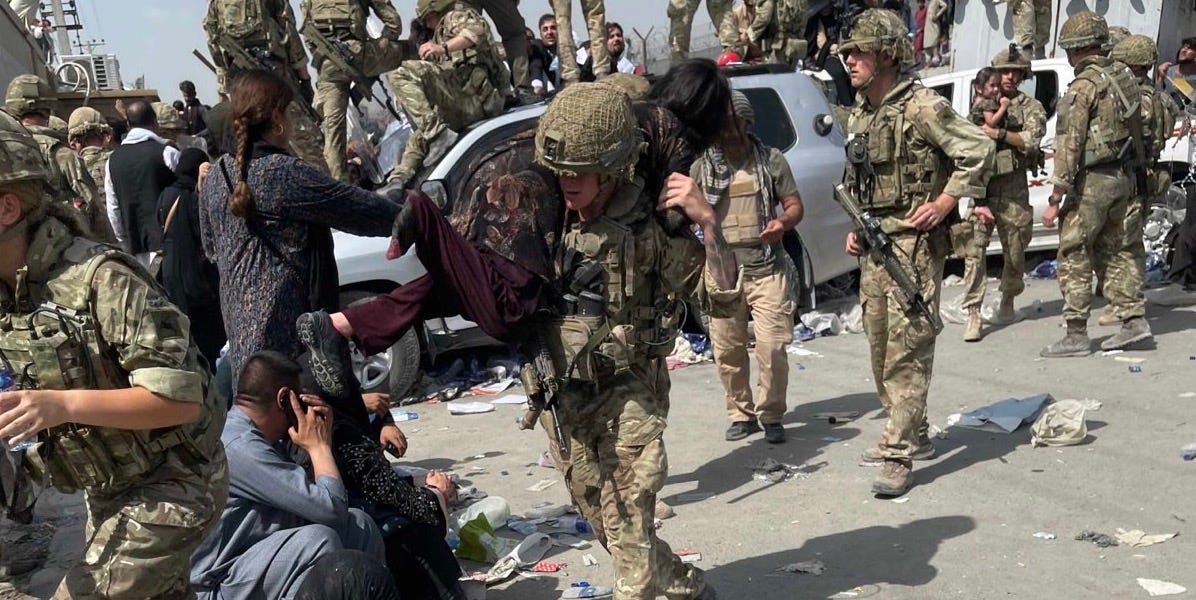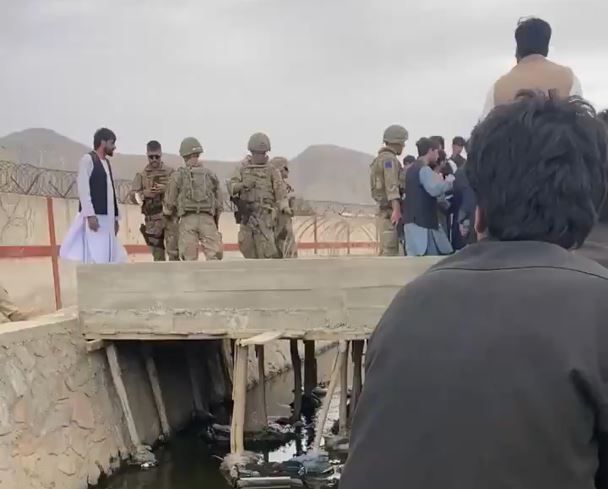Note from The Line: Normally on Friday evenings we would send you our weekly dispatch. Due to the situation in Afghanistan, and the urgent need to get civilians to safety, we are delaying publication of our dispatch until Saturday morning to bring you this article by journalist Kevin Newman, who is currently active in efforts to get people safely out of Kabul.
By: Kevin Newman
It was a brazen move the first time, but twice?
Ten buses screamed out of France’s embassy in Kabul early this week, past every Taliban checkpoint along the way, and according to eyewitnesses, zipped confidently through a back-entrance gate and straight onto the chaotic tarmac at Hamid Karzai International Airport. Five hundred exhausted and terrified passengers
were then loaded onto a French military aircraft which quickly took off.
And then it happened again on Thursday, four buses this time, under the guard of French special forces. As with the first convoy, Paris newspapers reported the buses carried French nationals stranded in Kabul, and hundreds of Afghans and their families the French embassy had given shelter to since before the Taliban roared into and re-occupied the city. Two ballsy airlifts took them to safety at a French military base in the United Arab Emirates, where hundreds of desperate people were given a hot meal, questioned about their identities and had their documents confirmed. Most were then sent on to Paris, where they received physical and mental-health support as well as cash, clothing, and places to stay as they begin their new lives.
On those same days in Kabul, another country tried to rescue its citizens and hundreds of Afghan interpreters and their families hiding throughout the city. I’ve pieced together what happened to them from texts and video Canadian veterans have been receiving every hour from people they know in Kabul, and I am sharing them with permission. I have verified each of these facts (from the peace of Canada) with multiple sources on the ground.
There were no buses, soldiers or escorts for these terrified people . Thursday they received a short text from Immigration, Refugees and Citizenship Canada (IRCC). They were instructed (in English only) to urgently head to the airport on their own, try to find a way through multiple Taliban checkpoints searching for them, and then if they survived that kilometres-long trip, figure out a way through thousands of desperate Afghans trying to flee. They were told by IRCC to carry documents to identify themselves to a gate agent, but because those same documents would be used to identify them by the Taliban, it was up to them to decide whether to carry them. With that, IRCC wiped its hands of responsibility. No direction on where to avoid Taliban checkpoints, no specific gates to head to (there are eight), and no Canadians on site to help. In fact there hadn’t been any Canadian officials in Kabul for a week, and when a few arrived hours after that text blast, reporters said they had travelled on an American military flight because their Canadian C-17 needed servicing somewhere else.
Needless to say, no one got through the airport, so they returned to their safe houses — wondering if their last flight to freedom had left without them.
It hadn’t. It never existed. Later that night another set of blasts went out again telling Afghans to move on their own to the airport. This time they were told to shout “Canada” and hope a soldier would hear them and help them through the airport gates. Taliban guards could hear them as well there, which would ensure that the target on their backs they had been trying to hide came completely into focus.
Two countries, two very different experiences for terrified Afghans, both on the same day. We’ll never know if some of those brave and desperate people didn’t make it through alive with all that futile moving back and forth to the airport in a city surrounded by Taliban. All we know for certain is none of more than one thousand people on the Canadian veterans’ list made it to freedom on Thursday, as France’s evacuees whisked past.
That very same day, Justin Trudeau blamed the Taliban for making it impossible to do better. “Unless the Taliban shift their posture significantly — which is something the international community and Canada are working on — it's going to be very difficult to get many people out,” the Liberal leader said.
But how did France do it? Well, it likely helped that they still had diplomats and military advisors in Kabul to negotiate (maybe bribe?) the Taliban to provide safe passage for their hundreds of refugees. All of our allies had eyes and boots on the ground this week at Kabul’s airport. Canada did not. It closed its embassy and withdrew all its diplomats and military by jet to Ottawa just as the Taliban was rolling into town. The government left no one behind to talk to the Taliban, or our allies, as they organized and negotiated the rescue of thousands.
Which left the handful of Canadian soldiers who finally returned late Thursday with little if any advance work to rely on. They started from scratch. Their only options were to ask for a lot of very large favours from the thousands of American and British soldiers who had been busy all week rescuing thousands of their own nationals and Afghans. Alliances are meant to share burdens. Canada, in Kabul this week, was only a taker.
We had already given up on about a thousand Afghans in Kandahar who had been allies during our military mission and were in various stages of completing the onerous and complex immigration paperwork for Canada. Those who escaped to Kabul for rescue tried to blend in, 800 of them in safe houses organized by Canadian veterans and funded with donations from concerned Canadians. Public appeals from retired generals and many other ex-soldiers to provide valuable intel they were receiving were largely dismissed, so as a country we had no situational awareness of our own to develop a plan, and rejected the only source of it — from Afghans we trained and veterans who still live and work there. We asked other countries to give us their homework instead.
These early days of this massive rescue effort by Western countries revealed some unflattering aspects of our national character. Canada has been slow to react, risk-averse and selfish. We’ve relied on our neighbours more than each other, turned our backs on thousands who’d proved their loyalty to us, and even blamed criminals for our inability to protect people we know are in real fear of being murdered. Our leaders have declared they wished they could have done more, but gosh, the Taliban won’t let us. Trudeau then batted aside suggestions the IRCC paperwork with its requirement for passport, biometric fingerprints and digital photographs had delayed everything. By Friday afternoon that nonsense was finally dropped. The airport chaos and confusion at the gates grew more alarming.
It was always going to be difficult to leave Afghanistan, but most other countries were a lot more successful at saving thousands of desperate people this week. Canada’s specific evacuation list from Kabul isn’t being revealed by the government, but veterans tracking it say as of Friday afternoon said those who defied the odds and made it onto a flight —
any flight — could be counted on two hands. There are still days to try something else and hopefully better. But not many.

theline.substack.com






